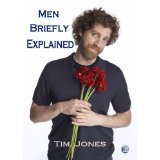A Magical Mystery Tour Through "Men Briefly Explained"—& A Few Side Topics—With Author Tim Jones
 Helen: So here's the thing, Tim: do men need to be explained? And if so, to whom?
Helen: So here's the thing, Tim: do men need to be explained? And if so, to whom?
Tim: Maybe to themselves? Although it's been very noticeable that it has been predominantly women who have bought the book so far. More seriously, though (generalisations ahead — they may not be the last), while I think it's true that women suffer most from media stereotyping, men are affected by it too. Whether it's the Southern Man, the horndog, or the lovably incompetent father who is the staple of so much US situation comedy, men get forced into moulds. I am hereby joining the campaign for less mouldy men!
Helen: I'm totally for less mouldy men! But do you think more women are buying the collection because of the potential 'explanation'—or is it simply that more women buy and read poetry? I realise both questions may appear equally 'fraught' for the unwary poet but you're a brave man, Tim, so I'm interested in your answer.
Tim: Good question — I would have thought that more women buy and read poetry, but in most of the audiences on the book tour, the numbers of women and men appeared to be roughly equal. Likewise, most of the poets I know are women, yet some research by Janis Freegard suggests that in recent years more men than women have published poetry collections. I suggested that this might be skewed by age (i.e. more older poets are male, but most younger poets are female), but apparently the figures don't back this up either.
Where are these additional male poets, that's what I'd like to know — is there some inner sanctum, redolent of pipe tobacco and aged slippers, from which I have been excluded? Is there a password or a secret handshake of some kind? I'm eager to know.
Helen: I'll let you know if I hear anything, Tim! Meanwhile, as you explained in the Kay McKenzie Cooke interview, Men Briefly Explained is themed around men, reflecting both personal experience and your observation of others—but are there any secondary themes that you feel also shape the work?
Tim: I think the main secondary theme that emerges in the collection is that of aging. That was probably inevitable as soon as I decided to structure the collection roughly chronologically — it starts with two-year-old immigrant me and ends with ashes. (Humorous, life-affirming ashes, of course.) I think of the collection as flowing around my chronological age — the 'middle years' poems look outwards at other men, while the poems of youth and young manhood are more directly about me, and I guess both my Dad and I are in the DNA of the poems about old age.
Another secondary theme, which I never get very far away from in my work, is landscape, and especially the landscapes of Southland and Otago, where I grew up. These days, I sit at a chair in front of a computer, adding spread to my middle, while my poems dream of mountains.
Maybe a third one, too — the distance between self-image and reality.
Helen: It sounds as though there's a great deal in Men Briefly Explained to be explored. Your last poetry project was an anthology you co-edited with Mark Pirie, Voyagers: Science Fiction Poetry from New Zealand. You also write speculative prose. Do you think the relationship between speculative fiction and poetry is a strong one? Or would you deny that there is any special interaction?
Tim: I have two answers to that. (I have two answers to most things!) The first is that there is an active nexus between the two in the form of speculative poetry — that is, science fiction, fantasy and horror poetry. My two previous collections, Boat People and All Blacks' Kitchen Gardens, had whole sections devoted to speculative poetry, whereas there are only a couple of arguably speculative poems in Men Briefly Explained. But I have scratched my speculative poetry itch this year by editing an issue of the Science Fiction Poetry Association's online journal Eye to the Telescope, and I'd like to put together a chapbook or collection of speculative poetry at some point.
The second answer is that a lot of poetry poses "what if?" questions, overtly or covertly, and for me, "what if?" is the question at the heart of speculative fiction — science fiction most of all.
Helen: Is there any one poem in the collection that's a personal favourite? And if so, why?
Tim: Another interviewer on my blog tour asked me this. My answer then was Thinning, which is the poem you kindly posted on your blog as a Tuesday Poem — and that remains one of my favourites, though it strikes some people as gloomy. But, just to be contrary, my favourite right at this instant is Return to Nussbaum Riegel, which Helen Rickerby posted recently as a Tuesday Poem on her blog. I like it because it's a bit cheeky, because it breaks more rules of poetry than there are rules to break (there are no rules to break, so that's not hard), and because it is about one of my favourite places in the world.
Helen: In the past few years you've published the Transported short fiction collection, co-edited Voyagers, and now released Men Briefly Explained? So what's next—some well-earned r'n'r, or do you have a new project waiting? A little bird told me that there might be a Tim Jones novel in the wings?
Tim: I'm working on a new collection of short fiction. When the New Zealand Society of Authors was kind enough to award me their Janet Frame Memorial Award for Literature in 2010, I said that I would put the money towards writing a new collection of short stories. That hasn't progressed as far as I'd like this year, and working on it will be my main writing focus for at least the first half of 2012. So while there might be a novel in the wings, it doesn't look as though it will be flying to centre-stage in the near future. But if I wake one morning to a scene straight out of Hitchcock's "The Birds", I'll know things are looking up on that front.
Helen: Finally, is there something you'd like to tell readers about Men Briefly Explainedthat you haven't yet been asked about?"
Tim: There are two poems with Buffy the Vampire Slayer allusions in this collection. Determining which they are is left as an exercise for the reader — but if I say that one refers to a scene in Issue 12 of the Season 8 comics, that gives the reader (should they be a Buffy obsessive) a pretty good clue.
Helen: So there you are folks—your mission, should you choose to accept, is to find those Buffy allusions in Men Briefly Explained! Thank you very much, Tim, for coming on the 'magical mystery tour'—and confirming what I've long suspected, that it does all come back to Buffy in the end. 
—
About the Author: Tim Jones is a poet and author of both science fiction and literary fiction who was awarded the New Zealand Society of Authors Janet Frame Memorial Award for Literature in 2010. Tim's previous collections are Boat People (2002) and The All Blacks' Kitchen Garden (HeadworX, 2007). Among his recent books are short story collection Transported (Vintage, 2008) and poetry anthology Voyagers: Science Fiction Poetry from New Zealand (Interactive Press, 2009), co-edited with Mark Pirie. Voyagers won the "Best Collected Work" category in the 2010 Sir Julius Vogel Awards.
—
How To Buy A Copy Of Men Briefly Explained
Men Briefly Explained is published by Interactive Press (IP) of Brisbane. You can find out more about Men Briefly Explained, and buy it direct from the publisher, on IP's mini-site for the book: http://www.ipoz.biz/Titles/MBE.htm
On Tim's Men Briefly Explained page, there are more options for buying the book in person and online, plus latest reader reactions and reviews: http://timjonesbooks.blogspot.com/p/men-briefly-explained.html




